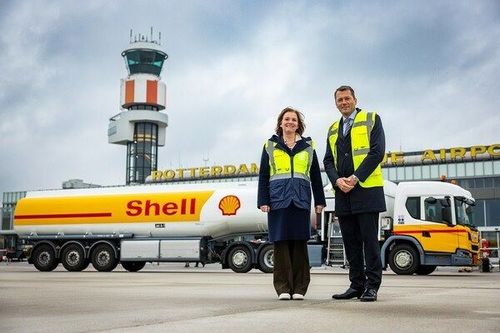Rotterdam The Hague Airport accelerates sustainable fuel blending

Wilma van Dijk and Jan Toschka. / SOURCE: Rotterdam The Hague Airport
November 29, 2023
BY Rotterdam The Hague Airport
On Nov. 16, Shell and Rotterdam The Hague Airport (RTHA) signed a long-term agreement to blend sustainable aviation fuel (SAF) on all aircraft fueled at the airport, starting in 2024. On top of the European blending mandate of 6 percent, the airport will accelerate its efforts by setting itself a minimum target of 8 percent to meet the more ambitious goal of the Dutch aviation sector of 14 percent by 2030. Using SAF is among the few measures currently available to reduce emissions from international aviation.
"Sustainable fuel is essential for the future of aviation,” says RTHA's CEO Wilma van Dijk. "This long-term agreement makes it possible for Shell to invest in production facilities while allowing airlines to gradually adapt to a new reality."
"It's fantastic to support Rotterdam The Hague Airport on decarbonizing flights through the use of SAF," added Jan Toschka, president of Shell Aviation. "It is particularly encouraging to see an airport committing to long-term SAF agreements, for volumes above the levels required under EU mandates. This type of ambition helps play an important role in providing strong, stable demand that is necessary for scaling up the supply and use of SAF."
Benefits of SAF
Advertisement
Advertisement
The added part sustainable fuel can lead to a CO₂ reduction of on average 80 percent across the chain. Besides this, sustainable fuel leads to a reduction of soot and ultrafine particle emissions, which at higher percentages of blending, improves air quality.
Shell is building an 820,000-tonnes-a-year biofuels facility at the Shell Energy and Chemicals Park Rotterdam, which will produce SAF and renewable diesel made from waste.
Phasing in SAF
For the moment, SAF is still much more costly than fossil kerosene. For this reason, and because large-scale production of SAF has yet to take off, it is important to phase in additional blending requirements. RTHA has chosen to sign a long-term agreement with Shell in order to offer transparency on the growth path and cost for the users at the airport.
Advertisement
Advertisement
More blending necessary to meet targets
As a result of the European blending mandate, the aviation sector must blend in 2 percent SAF across the board by 2025. The target for 2030 is 6 percent. However, this is not enough to meet the Dutch aviation sector's more ambitious target of 14 percent SAF by 2030, as set out in the Sustainable Aviation Agreement.
RTHA therefore wants to speed things up by raising the target for 2024 by an additional 2 percentage points. This will be followed by incremental yearly increases of at least one percentage point until 2030, making for a total additional increase of minimal 8 percentage points by 2030, on top of the statutory 6 percent. Thanks to this extra blending push, the 14 percent SAF target will be met at Rotterdam The Hague Airport.
Related Stories
Broco Energy on July 17 announced a new partnership with the Massachusetts Port Authority (Massport) to deliver and transition Massport's fuel tanks to renewable diesel across its various facilities.
Shell Aviation, Accenture, and Amex GBT on July 10 announced Avelia is in the process of evolving to an industry solution with independent data hosting and a multi-supplier model helping users access the GHG benefits of SAF.
The U.S EPA on July 17 released data showing more than 1.9 billion RINs were generated under the RFS during June, down 11% when compared to the same month of last year. Total RIN generation for the first half of 2025 reached 11.17 billion.
The U.S. EPA on July 17 published updated small refinery exemption (SRE) data, reporting that six new SRE petitions have been filed under the RFS during the past month. A total of 195 SRE petitions are now pending.
European biodiesel producer Greenergy on July 10 confirmed plans to shut down its biodiesel plant in Immingham, Lincolnshire, U.K. The company temporarily suspended operations at the facility earlier this year.
Upcoming Events










